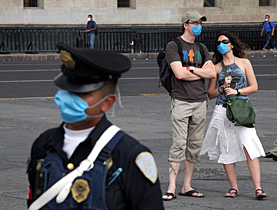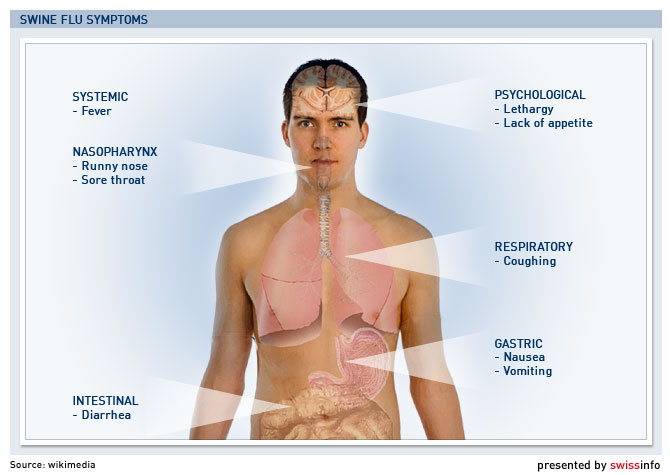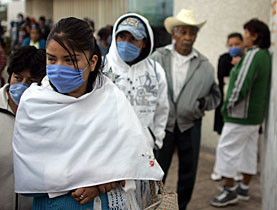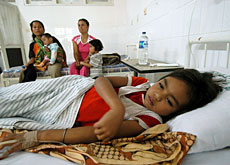Swiss in Mexico City describes swine flu impact

As more cases of swine flu are confirmed around the world, a Swiss living in Mexico City tells swissinfo how locals are coping with the disruptions and uncertainty.
Carole D, who has requested anonymity, says she wants to leave the city as soon as possible, but her daughter’s boyfriend has developed a fever and is waiting for hospital tests.
“The streets have been incredibly empty since Sunday – no traffic jams, nothing,” said Carole, an estate agent originally from Fribourg.
“Normally Mexicans make fun of everything, but they’ve realised the seriousness of the situation.”
The new H1N1 virus has been confirmed around the world but Mexico is one of only two countries with deaths – 159 by the government’s estimate, with more than 2,000 ill – and the epicentre of the outbreak.
On Tuesday it was reported that a baby in Texas had died from swine flu.
Mexico City, one of the world’s largest cities with a total of more than 22 million inhabitants, has taken drastic steps to curb the virus’s spread, starting with shutting down schools and universities.
On Tuesday the city’s mayor ordered restaurants to limit service to takeouts and deliveries. He also closed gyms, swimming pools and museums and restricted access to many government buildings.
“Some offices are open for business, but I find that ridiculous,” Carole said.
Even before the restaurant closings, the capital has lost 777 million pesos (SFr64 million) a day since the outbreak began, said the president of the city’s Chamber of Trade, Services and Tourism.
Family concern
Carole, whose daughter has stopped going to university, put on her mask and tried to go to work on Monday but quickly returned home.
“I stay indoors and listen to the countless news flashes on radio and TV. I also surf the internet. The media hysteria has certainly contributed to people’s fear. You shouldn’t go to the bank, to restaurants – anywhere…”
She says the safety instructions are very clear. “Wash your hands, wear a mask and get to a hospital at the slightest sign of a symptom. They’ve also told us that we shouldn’t try to medicate ourselves with Tamiflu if we’re not ill.”
She adds however that not all Mexicans stick to these guidelines.
“On Monday I counted only four taxi drivers out of ten wearing face masks,” she said. “And the bus stops are still packed with poor people who are forced to go into work.”
In addition, because of the searing heat and air conditioning “everyone has a cough and it’s hard to know whether you’re genuinely ill”.
Carole is hoping to leave as soon as possible with her daughter and spend the weekend, a national holiday, at her house in the mountains in the south of the country.
“But we can’t go immediately. My biggest worry is that my daughter’s boyfriend has had a fever of 39 degrees since Monday evening. He’s got to go and have some tests at the hospital and I’m really worried that he’s been infected. If that’s the case, my daughter and I will also fall ill – that’s for sure…”
Travel bans
According to the World Health Organization (WHO) swine flu has killed seven people in Mexico. Switzerland, the United States, Canada and the European Union have all advised against non-essential travel to the country.
However, the WHO argues against closing borders to stem the spread and the US – which has 66 confirmed cases – agrees it’s too late for that tactic.
British Holiday tour operator Thomas Cook has cancelled all holidays to Cancún, an eastern coastal city, for the next seven days, and Thomson Holidays said it would not operate any more flights to Mexico until the British Foreign Office changed its travel advice.
But for Carole this is too late. She is convinced that the problem stems from Mexico City’s massive airport. She thinks the authorities should have closed it or prevented people from leaving it.
“In such a massive crowd, all it takes is for one person to sneeze and that’s it. This is how the Europeans were infected,” she believes.
Rumours
US officials have stressed there is no need for panic, noting that flu outbreaks are quite common every year. The national disease control centre estimates that an average of 36,000 people died of flu-related causes each year in the US alone in the 1990s.
Still, without a solid understanding of where the outbreak began or even how fast it is spreading in Mexico, authorities were focused on preventing people from gathering in groups where mass contagion could result.
The Swiss embassy in Mexico says it has received “a considerable number of phone calls” over the past few days from members of the concerned 5,000-strong Swiss community.
“They were informed of the appropriate measures, as recommended by the WHO and the local health authorities,” the embassy said.
Amid the uncertainty, Carole says crazy rumours are circulating in Mexico.
“A week ago Barack Obama came to Mexico and visited the anthropological museum,” she said. “He shook the hand of the museum director who died three days later!”
swissinfo, based on an article in French by Isabelle Eichenberger
To protect from infection:
Avoid close contact with people who appear unwell and who have fever and cough.
Wash your hands with soap and water frequently and thoroughly.
Practise good health habits including adequate sleep, eating nutritious food and keeping physically active.
This swine flu variation, termed H1N1, is an influenza A virus spreading from person to person. It contains DNA from avian, swine and human viruses. Although swine flu viruses normally infect only pigs, they do sometimes cross the species barrier to cause disease in humans, according to the WHO.
It is passed from human to human by sneezing, coughing or by hand contact. The WHO says swine flu is not transmitted to people eating properly handled and prepared pork or other products derived from pigs. The virus is killed in cooking temperatures above 70°C.
Swine flu is characterised by common flu symptoms – sudden fever, muscle aches, sore throat and dry cough – but may cause more severe vomiting and diarrhoea.
New flu strains can spread fast because no one has natural immunity and a vaccine can take months to develop.


In compliance with the JTI standards
More: SWI swissinfo.ch certified by the Journalism Trust Initiative



You can find an overview of ongoing debates with our journalists here. Please join us!
If you want to start a conversation about a topic raised in this article or want to report factual errors, email us at english@swissinfo.ch.